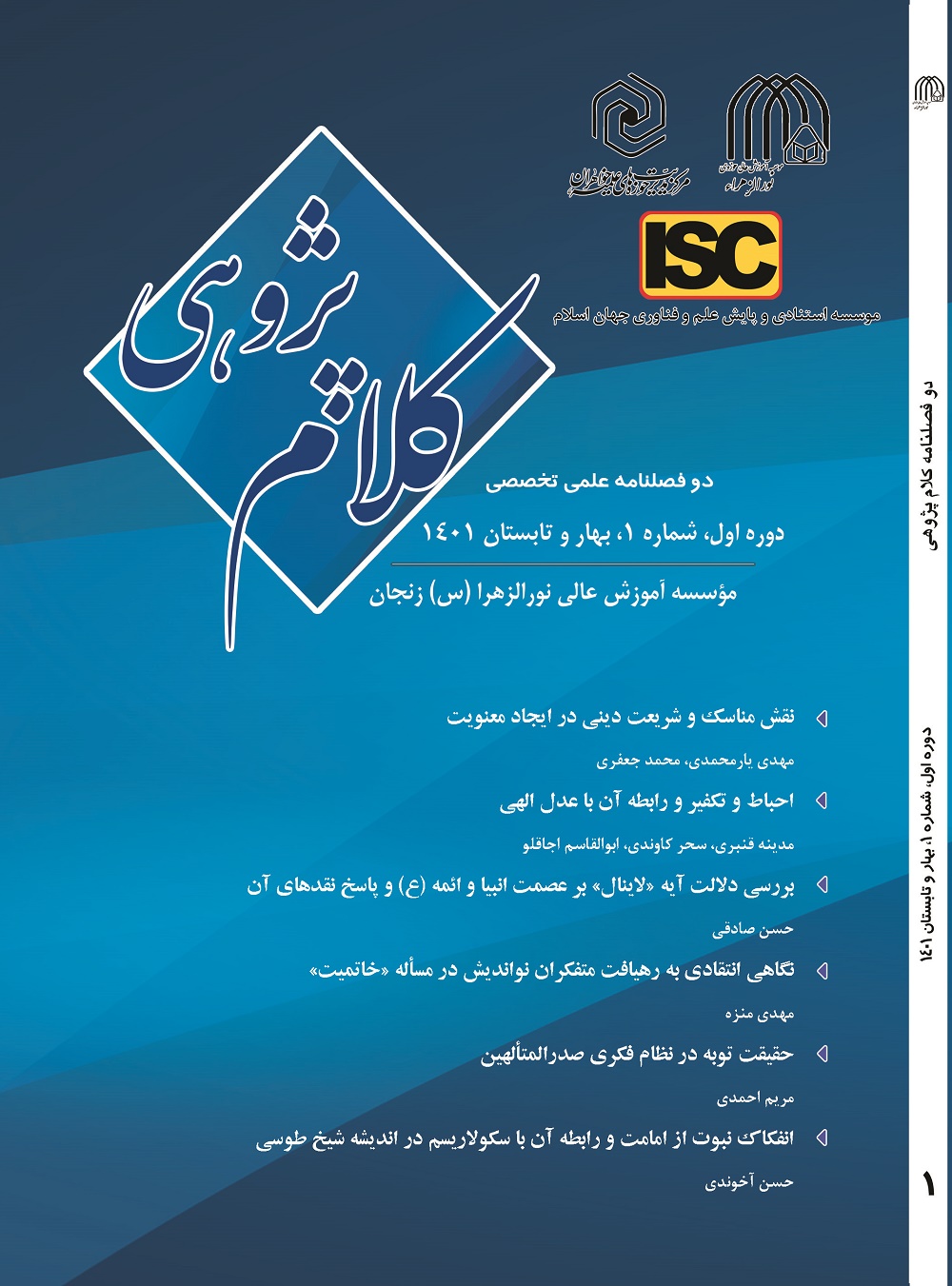نوع مقاله : مقاله پژوهشی
نویسنده
دانشپژوه سطح چهار کلام اسلامی حوزه علمیه قم.
چکیده
در دین اسلام تشکیل حکومت توسط پیامبر و امامان دارای جایگاه ویژهای است. در دوران غیبت امام نیز مهمترین دلیل برای تشکیل حکومت، استمرار حاکمیت دین و انبیای الهی است. در بین اندیشمندان امامیه، شیخ طوسی با ارائه دلایلی، نظریه انفکاک امامت از نبوت را مطرح کرده و حوزه اجرا و حاکمیت را جزو وظایف نبی نمیداند. شاید بتوان این دیدگاه شیخ را همان سکولاریسم دانست. این نوشتار به تبیین این مساله پرداخته و با ارائه دلایلی از آثار شیخ، انتساب نظریه سکولاریسم به او را رد کرده است. اما در مورد مساله انفکاک امامت از نبوت به نظر میرسد که او در مواردی ناخواسته به این نظریه معتقد شده است.
کلیدواژهها
عنوان مقاله [English]
Separation of Prophecy from Imamate and its relation to Secularism in Shaykh Tusi's thought system
نویسنده [English]
- hasan Akhondi
دانشپژوه سطح چهار کلام اسلامی حوزه علمیه قم.
چکیده [English]
In Islam, establishing a government by Prophet and Imams is awarded a special status. During the occultation of the Imam, the most important reason for founding a government is to maintain the sovereignty of religion and divine prophets. Among Imamiyya thinkers, Shaykh Tusi brought up the theory of separation of Imamate and Prophecy. He does not regard executive domain and sovereignty to be a part of the prophet’s responsibilities. He also believes in the separation of Imamate from Prophecy. Such a viewpoint may be considered as the equivalent of Secularism. The current article attempts to clarify this issue and by drawing on the evidence in Shaykh’s works, it refutes the attribution of Secularism to his theory. However, regarding the question of Imamate, in some instances he has inadvertently expressed his belief in the theory.
کلیدواژهها [English]
- Imamate
- Prophecy
- Secularism
- Government
- Shaykh Tusi
قرآن.
- اسدآبادی، عبدالجبار، 1422، شرح الأصول الخمسة، بیروت، اول.
- ____________، 1962، المغنیفی ابواب التوحید و العدل، قاهره.
- بیات، عبدالرسول و دیگران، 1386، فرهنگ واژه ها، قم، سوم.
- تفتازانی، سعد الدین؛ 1407، شرح العقائد النسفیة، قاهره، اول.
- ثعلبى، احمد بن محمد، 1422، الکشف و البیان المعروف تفسیر الثعلبی، بیروت، اول.
- جاحظ، ابوعثمان عمرو، 2002، رسائل الجاحظ، بیروت.
- جوادی آملی، عبدالله، 1384، وحی و نبوت در قرآن، قم، دوم.
- ____________، 1386، سرچشمه اندیشه، قم، پنجم.
- ____________، 1387، نسبت دین و دنیا، قم، پنجم.
- ____________، 1388، وحی و نبوت، قم، اول.
- ____________، 1389، ولایت فقیه، قم، نهم.
- ____________،1387، تسنیم، قم، دوم.
- زمخشرى، محمود بن عمر، 1407، الکشاف عن حقائق غوامض التنزیل و عیون الأقاویل فى وجوه التأویل، بیروت، سوم.
- طباطبایى، سید محمد حسین، 1417، المیزان فى تفسیر القرآن، قم، پنجم.
- طبرسى، فضل بن حسن، 1372، مجمع البیان فی تفسیر القرآن، تهران، سوم.
- طوسى، محمد ابن حسن، 1406، اقتصاد فیما یتعلق بالاعتقاد، بیروت، دوم.
- ____________، 1406، الاقتصاد فیما یتعلق بالاعتقاد، بیروت، دوم.
- ____________، 1414، الرسائل العشر، قم.
- ____________، بی تا، التبیان فی تفسیر القرآن، بیروت، اول.
- ____________، 1347، الجمل و العقود، مشهد،
- ____________، 1382، تلخیص الشافی، قم – ایران.
- ____________، 1400، النهایة فی مجرد الفقه و الفتاوی، بیروت.
- ____________، 1414، الأمالی، قم.
- ____________، 1420، فهرست کتب الشیعة و أصولهم و أسماء المصنفین و أصحاب الأصول، قم.
- کلینى، محمّد بن یعقوب بن إسحاق، 1362، الکافی، تهران، دوم، ش.
- مجاهد بن جبر، أبو الحجاج، 1410، تفسیر مجاهد، مصر.
- نو بخت، ابو اسحاق ابراهیم، 1413، الیاقوت فی علم الکلام، قم.

